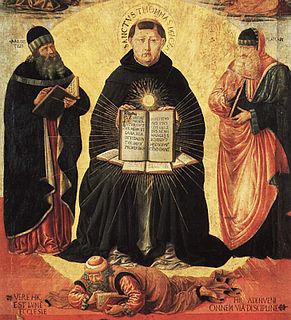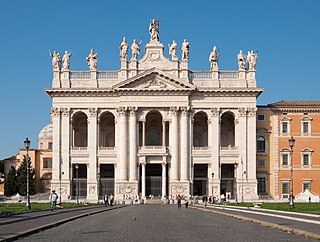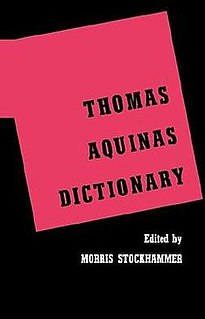Related Research Articles
Faith and rationality are two ideologies that exist in varying degrees of conflict or compatibility. Rationality is based on reason or facts. Faith is belief in inspiration, revelation, or authority. The word faith sometimes refers to a belief that is held with lack of reason or evidence, a belief that is held in spite of or against reason or evidence, or it can refer to belief based upon a degree of evidential warrant.

In Christian theology, Charity is considered as one of the seven virtues and is understood by Thomas Aquinas as "the friendship of man for God", which "unites us to God". He holds it as "the most excellent of the virtues". Further, Aquinas holds that "the habit of charity extends not only to the love of God, but also to the love of our neighbor".
Systematic theology is a discipline of Christian theology that formulates an orderly, rational, and coherent account of the doctrines of the Christian faith. It addresses issues such as what the Bible teaches about certain topics or what is true about God and his universe. It also builds on biblical disciplines, church history, as well as biblical and historical theology. Systematic theology shares its systematic tasks with other disciplines such as constructive theology, dogmatics, ethics, apologetics, and philosophy of religion.

The Summa contra Gentiles is one of the best-known treatises by St Thomas Aquinas, written as four books between 1259 and 1265.

François Turrettini was a Genevan-Italian Reformed scholastic theologian.

Herman Bavinck was a Dutch Reformed theologian and churchman. He was a significant scholar in the Calvinist tradition, alongside Abraham Kuyper and B. B. Warfield.
Philosophical theology is both a branch and form of theology in which philosophical methods are used in developing or analyzing theological concepts. It therefore includes natural theology as well as philosophical treatments of orthodox and heterodox theology. Philosophical theology is also closely related to the philosophy of religion.
In one sense, faith in Christianity is often discussed in terms of believing God's promises, trusting in his faithfulness, and relying on God's character and faithfulness to act. Some of the definitions in the history of Christian theology have followed the biblical formulation in Hebrews 11:1: "the assurance of things hoped for, the conviction of things not seen". As in other Abrahamic religions, it includes a belief in the existence of God, in the reality of a transcendent domain that God administers as his kingdom and in the benevolence of the will of God or God's plan for humankind.

The Summa Theologiae is the best-known work of Thomas Aquinas. Although unfinished, the Summa is "one of the classics of the history of philosophy and one of the most influential works of Western literature." It is intended as an instructional guide for theology students, including seminarians and the literate laity. It is a compendium of all of the main theological teachings of the Catholic Church. It presents the reasoning for almost all points of Christian theology in the West. The Summa's topics follow a cycle: God; Creation, Man; Man's purpose; Christ; the Sacraments; and back to God.

Contra errores Graecorum, ad Urbanum IV Pontificem Maximum is a short treatise written in 1263 by Roman Catholic theologian Saint Thomas Aquinas as a contribution to Pope Urban's efforts at reunion with the Eastern Church. Aquinas wrote the treatise in 1263 while he was papal theologian and conventual lector in the Dominican studium at Orvieto after his first regency as professor of theology at the University of Paris which ended in 1259 and before he took up his duties in 1265 reforming the Dominican studium at Santa Sabina, the forerunner of the Pontifical University of Saint Thomas Aquinas, Angelicum, in Rome.

Thomistic sacramental theology is St. Thomas Aquinas's theology of the sacraments of the Catholic Church. It can be found through his writings in the Summa contra Gentiles and in the Summa Theologiæ. As can be seen, Aquinas relied heavily on Scriptural passages, as well as the writings of various Church Fathers. St. Augustine says : "The visible sacrifice is the sacrament. This is the sacred sign of the invisible sacrifice. A thing is called a sacrament, either by having a certain hidden sanctity, and in this sense a sacrament is a sacred secret; or from having some relationship to this sanctity. A sacrament is a sign. Moreover, it is a sacred sign. Divine Wisdom provides for each thing according to its mode. Wisdom 7,1 : "she... ordered all things sweetly"; and from Matthew 25,15: "[she] gave to everyone according to his proper ability." It is a part of human nature to acquire knowledge of the intelligible from the sensible. A sign is the way one obtains knowledge of something else. The sacraments are the signs by which humans gain knowledge of spiritual and intelligible goods. Ephesians 5, 25-26: "Christ loved the Church, and delivered Himself up for it; that He might sanctify it, cleansing it by the laver of water in the word of life." St. Augustine says : "The word is added to the element, and this becomes the sacrament." Augustine : "It is impossible to keep men together in one religious denomination, whether true or false, except they be united by means of visible signs or sacraments." It is necessary for salvation that humans united together in the name of true religion. Therefore, sacraments are necessary for man's salvation. There are three reasons sacraments are necessary to the salvation of humans: First, it is in the nature of humans to be led by things corporal and sensible to things that are spiritual and intelligible. Second, by sinning, humans have subjected themselves to corporeal things. Therefore, it is proper that the remedy have a corporeal side, leading to the spiritual. Third, humans are prone to direct their activity towards material things. Sacraments are made necessary because humans have sinned. The main effect of the sacraments is grace, in particular those involving Virtues and Gifts. Grace perfects the soul and allow participation in the Divine Nature. Furthermore, the effects of the sacraments is justification. This is an interior effect. Romans 8,33: "God justifies." Therefore, the effects of the sacraments is justification. This is an interior effect. The power of the sacraments is from God, alone. It does not matter that the minister of the sacraments may be a sinner, or evil. Augustine : "He upon Whom you shall see the Spirit, ...that John did not know that our Lord, having the authority of baptizing, would keep it to Himself, but that the ministry would certainly pass to both good and evil men...What is a bad minister to you, wherever the Lord is good?"

The Mosaic covenant or Law of Moses – which Christians generally call the "Old Covenant" – has played an important role in the origins of Christianity and has occasioned serious dispute and controversy since the beginnings of Christianity: note for example Jesus' teaching of the Law during his Sermon on the Mount and the circumcision controversy in early Christianity.
Johan Herman Bavinck was a Dutch pastor, missionary and theologian.

Thomas Aquinas was an Italian Dominican friar, philosopher, Catholic priest, and Doctor of the Church. An immensely influential philosopher, theologian, and jurist in the tradition of scholasticism, he is also known within the latter as the Doctor Angelicus and the Doctor Communis. The name Aquinas identifies his ancestral origins in the county of Aquino in present-day Lazio, Italy. He was the foremost classical proponent of natural theology and the father of Thomism; of which he argued that reason is found in God. His influence on Western thought is considerable, and much of modern philosophy developed or opposed his ideas, particularly in the areas of ethics, natural law, metaphysics, and political theory.

The doctrine of sin is central to Christianity, since its basic message is about redemption in Christ. Christian hamartiology, a branch of Christian theology which is the study of sin, describes sin as an act of offence against God by despising His persons and Christian biblical law, and by injuring others. In Christian views it is an evil human act, which violates the rational nature of man as well as God's nature and His eternal law. According to the classical definition of St. Augustine of Hippo sin is "a word, deed, or desire in opposition to the eternal law of God." Christian hamartiology is closely related to concepts of natural law, moral theology and Christian ethics.
This is a list of articles in philosophy of religion.

The Latin Church, also known as the Western Church or the Roman Catholic Church, is the largest particular church sui iuris of the Catholic Church, employing the Latin liturgical rites. It is one of 24 such churches, the 23 others forming the Eastern Catholic Churches. It is headed by the Bishop of Rome, the pope – traditionally also called the Patriarch of the West – with his cathedra in this role at the Archbasilica of Saint John Lateran in Rome, Italy. The Latin Church traces its history to the earliest days of Christianity through its direct leadership under the Holy See, founded by Peter and Paul, according to Catholic tradition.
Reformed scholasticism or Reformed orthodoxy was academic theology practiced by Reformed theologians using the scholastic method during the period of Protestant orthodoxy in the 16th to 18th centuries. While the Reformed often used "scholastic" as a term of derision for their Roman Catholic opponents and the content of their theology, most Reformed theologians during this period can properly be called scholastics with respect to the method of theology, though they also used other methods. J. V. Fesko describes scholasticism in this sense as "a method of doing theology that sets out to achieve theological precision through the exegesis of Scripture, an examination of how doctrine has been historically defined throughout church history, and how doctrine is expounded in contemporary debate."

The Thomas Aquinas Dictionary is a collection of quotations by medieval philosopher and theologian Thomas Aquinas, indexed by keywords contained within the quotations. Most of the quotations are taken from the Summa Theologica, with additional material from the Summa contra Gentiles. The quotations are listed without additional commentary or explanatory notes, although the volume does contain an introduction to the work of Thomas Aquinas written by Theodore E. James. Scholarly reviews were critical of the work when it was published, particularly in terms of the selection and arrangement of material. The book does, however, still appear in bibliographies of reference material on Thomas Aquinas.
The Reformed systematic theology bibliography lists complete works of systematic theology in the Reformed tradition. Systematic theology is the orderly formulation of Christian doctrines and beliefs. This bibliography includes works which attempt to present a coherent account of all major doctrines of the Reformed faith. Theologians considered by scholars to be in the Reformed tradition are included, even if they are considered to have departed from any particular conception of the Reformed faith.
References
This article includes a list of references, related reading or external links, but its sources remain unclear because it lacks inline citations .(November 2010) (Learn how and when to remove this template message) |
- Bavinck, Johan Herman. 1964. An Introduction to the Science of Missions. Philadelphia, Pennsylvania: The Presbyterian and Reformed Publishing Company.